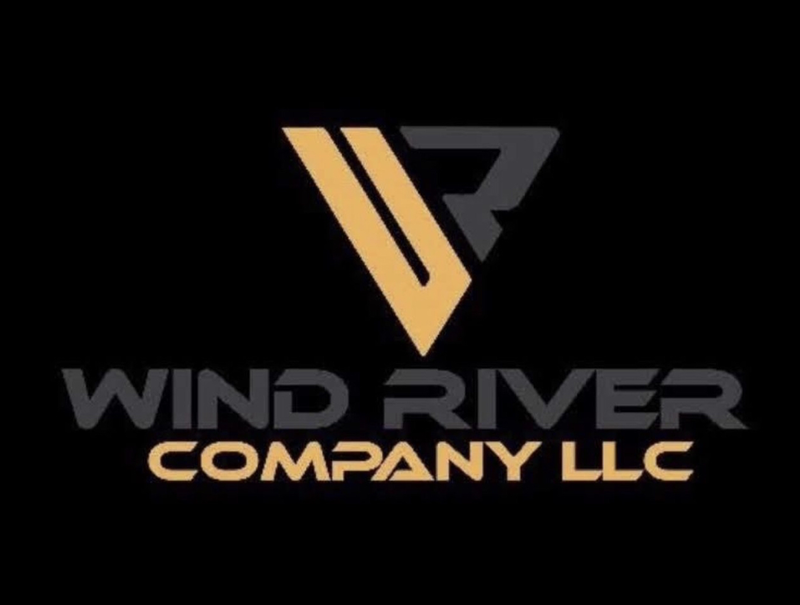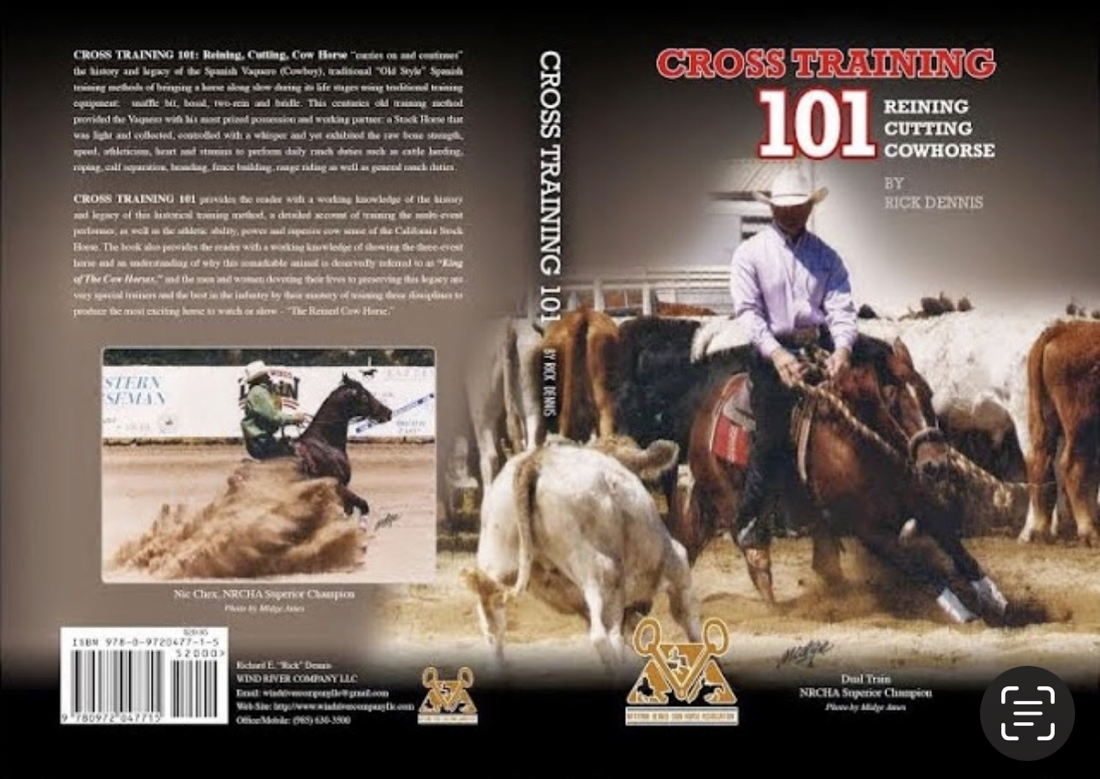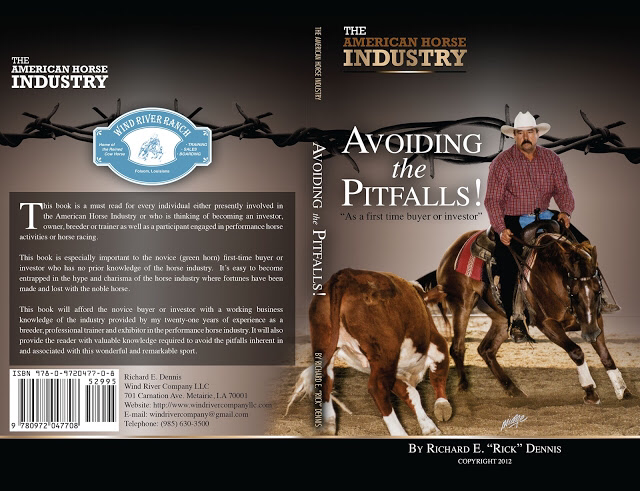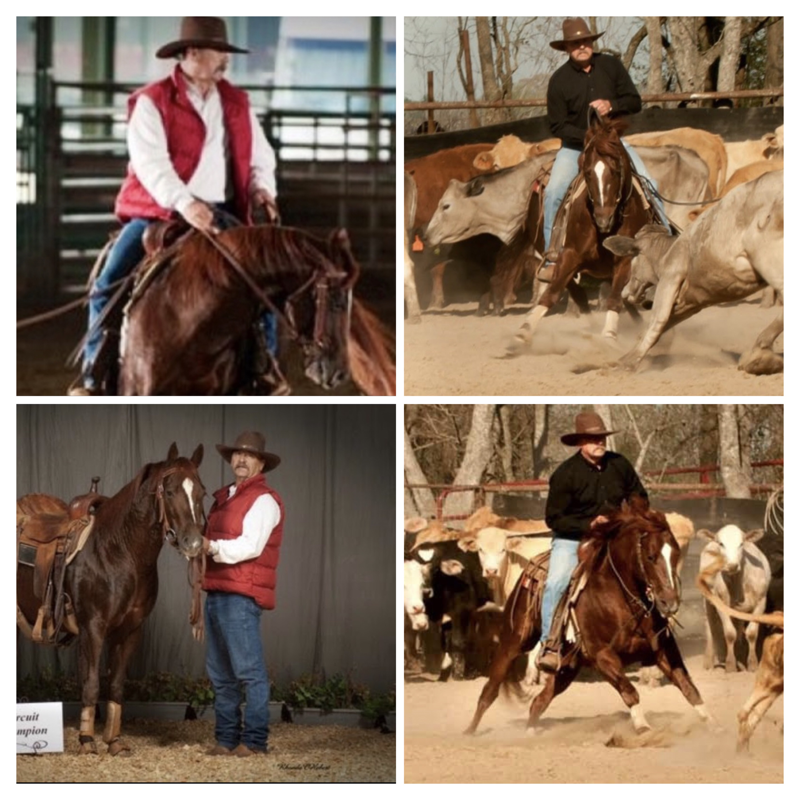|
THE BUSINESS OF RESCUING HORSES
By Richard E. “Rick” Dennis CPP Certified Protection Professional Certified Reined Cow Horse Trainer December 19, 2023 © 2023, All Rights Reserved A HORSE SAVING DICHOTOMY SOUL HORSES LLC SOUL HORSES, LLC is a Beaumont, Texas based sole owned limited liability company; owned by Randi Collier. Outside this central business location, are where Ms. Collier’s rehabilitation centers are located. At each location, a typical day begins, during the mist of the early pre-dawn morning light, with the sounds of feed buckets being filled and the excited whinnying of horses eagerly awaiting the arrival of their morning feed. However, these horses are the lucky ones. They are more fortunate than a myriad other horses in their exact previous predicament, i.e., they were able to escape the horse slaughter pipeline, via, the generous but heart felt money donations of Ms. Collier’s supporters, the dedicated and compassionate actions of their ardent protector, Ms. Collier, and the dedicated actions of Ms. Collier’s associates running the rehabilitation centers. Notwithstanding, all these individuals share one common denominator in the equation of life. Their love of the noble horse. Moreover, it takes more than the love of the horse to embark on this journey. It takes dedication, hard work, compassion, a generous heart, and the tenacity to stay in the endeavor for the long haul. The horse rescue business is a tough business to be in, especially when, in some cases, the odds don’t always work out in favor of the horse. According to Ms. Collier it takes a lot of hard work, hope, love, and prayers to realize a successful outcome. In most cases, this is true. However, with kill pen horses some are very malnourished, some are extremely sick, from associating with horses with contagious diseases, while at the kill pen, and some are suffering from extreme neglect and abuse. Therefore, not every horse's outcome outside the kill pen results in a Cinderella outcome. Another obstacle to overcome is trust. This is extremely true with horses who come to Soul Horses LLC who have been abused which makes the task of rehabilitation more arduous than others who haven’t suffered from extreme abuse while in the horse slaughter pipeline. Nonetheless, it’s a life Ms. Collier and her associates love, and they feel the risks are worth it. There’s a myriad ways horses enter the horse slaughter pipeline, example: Individuals seeking instant gratification, a Thoroughbred racehorse can’t win at the track, two-year-olds are broken down during training, something as small as a blemish can be the cause, owners die and heirs dispose, people lose their jobs and file for bankruptcy. Whatever the reason, the noble horse has become a disposable commodity. However, there’s individuals in the industry who desire to help the noble horse. One such individual is Randi Collier of Beaumont, Texas and the owner of SOUL HORSES LLC. RANDI COLLIER’S AUTOBIOGRAPHY According to Randi Collier, in her own words: “I was born July 9th in Beaumont, Texas. I began riding lessons at Tyrell Park Stables under the instruction of Pat Sykes at the age of 8. My mother noticed my athleticism and my increasing love of horses and signed me up for lessons. My lessons included equitation and how to take care of the horse including mucking stalls. During equitation lessons, I learned how to jump and take a fall while riding bareback. I found this portion of my training pretty scary, especially because I had nothing to hold onto, but the horse's mane. When I was age 11, I met Jean McFaddin of Plum Nearly Ranch. To this day, I hold her in high regard and my hero. While under her tutelage she nurtured my love of horses and introduced me to my lifelong love, the Arabian Horse. Jean McFaddin, whom I hold in the highest esteem remains one of my heroes to this day. Over-the-years, Ive shown, trained, ridden, and provided riding lessons. All of my life, I was made aware of slaughter bound horses and kill pens. As a child, I was quite fortunate to grow up around people who genuinely loved horses and valued them, much like family. I never dreamed that such a seedy underside of the horse world existed. I remain stunned to this cruelty to this day. With a willingness to help these horses I’ve read and learned everything I could about slaughter bound horses, kill pens (etc). In 2015, with the help of Emily McKinney I rescued my first kill pen horse, a chestnut Arabian mare named Merida from Kaufman Kill Pen. This first horse rescue began a long friendship that would later become a partnership, fueled by our mutual love of horses and the desire to help as many horses bound for the slaughterhouse as possible. An endeavor we still do today. Though I suffer from crippling anxiety and agoraphobia (which worsened with the onslaught of repeated false social media attacks which went on for years and in some instances continues to this day, I found a way to continue doing what I love. SOUL HORSES LLC’S REHAB AND REHOME PROGRAM Unlike other rescue programs that strictly rely on donor money for sustainability, SOUL HORSES LLC’S “REHAB and REHOME” program provides much needed funding to supplement private donations in-order to continually rescue horses and keep the business operational. According to Randi Collier, “While we appreciate any public donations and support, I don’t feel it should be the public’s responsibility to fund my passion and my work, there are enough rescues operating that way and strictly relying on donor funding.” I feel that I’ve designed a better way to help my program and my horses – REHAB and REHOME. Randi Collier quotes “When people see ‘LLC’ and think “Profit,” it’s a bit laughable, especially when you consider the costs of healthy horses, versus rescue horses. Rescue horses are always requiring more attention and services than healthy horses do. One goal is to make these horses WANTED, and to offer safe, healthy, enjoyable horses for people. Another goal is to provide income for the next horse in need. The rehoming of one will give the next two that same chance. The REHAB and REHOME program also provide the rescued horse with the opportunity to be loved again, or perhaps loved for the first time.” Notwithstanding, those rescues, that rescue horses to become yard ornaments and strictly rely on donor funding for sustainability, in all probability won’t and usually doesn’t work out very well. On the other hand, Randi Collier’s REHAB and REHOME program is designed to revitalize a horse and return it to usable status. Essentially, the program works by rescuing a horse, sending it to a rehabilitation facility where it receives required and necessary veterinarian care, food, and the horse is placed with a trainer. The trainer introduces the rescue to a daily exercise regimen, re- reconditioned the horse, and eventually makes the horse suitable for the general public to ride and enjoy. Once this revitalization process is over the rescue horse is offered for sale on the open market as a usable commodity. In essence, the rescue horse is actually paying for itself while at the same time supplying SOUL HORSES LLC with sustainable income to supplement private donations in-order to maintain business operating costs and overhead. Furthermore, as Randi Collier previously stated, the funds provided by the rehoming process also serves to rescue other horses trapped in the horse slaughter pipeline. MEETING RANDI COLLIER – DESTINY OR FATE A number of years ago, I first met Randi Collier under the most bizarre and peculiar circumstances. More specifically, a group of online individuals including a lawyer wanted to hire me to, in their words, ruin Randi Collier. With an 18-year background in drug enforcement and law enforcement my criminal investigative mind wondered why this group of women wanted to hire me for this job. Professionally, I’m a Risk Manager and Analyst specializing in Threat Vulnerability and Risk Assessment, so the natural occurrence was to request documents from the accusers, for analysis, to substantiate the accusers claims. However, pursuant to analyzing the submitted documents, legitimacy was unattainable. Therefore, I decided to contact Randi Collier directly. For the record, the initial contact was comical to say the least! Being the up-front and straight to the point type of guy that I am, I decided to broach the subject and ask Randi Collier, point-blank, why someone would want to ruin her. After the shock and surprise subsided, Randi Collier and I had a professional business conversation. At the end of the conversation Randi Collier asked me if I would work for her and conduct a Risk Analysis of her business operation, which I agreed to perform. At the end of the analysis, I concluded Randi Collier’s business operation was legitimate, legal in every respect, but required some minor tweaking. A Risk Report was written and submitted to Randi Collier, including the suggested changes which she made, and the rest is history so-to-speak. One would think, this saga would end here but it doesn’t! A year or so later, the same group of disgruntled women made another run at Randi Collier. However, the end result would be quite different. Example: Again, Randi Collier hired me to work for her and perform the required Risk Management services. Essentially, the antagonists became the pursued and resulted in criminal complaints being filed in the State of Texas Department of Public Safety, with the Texas Rangers, and the Attorney General. Criminal complaints were also filed with the Department of Justice in the Western District of Louisiana, and the Louisiana Attorney General's office. Thereafter, it didn’t work out very well for the pursuers! To my knowledge, no one in the horse rescue business has been more victimized, maligned, slandered, and interviewed more, by law enforcement agencies, than Randi Collier. The law enforcement agencies included, but are not limited to, the Federal Bureau of Investigation (FBI), the State of Texas, and law enforcement agencies in Louisiana. For the record, all of the law enforcement interviews were prompted by false and erroneous information supplied by disgruntled internet trolls most of which used false identities while hiding behind computer screens. However, on all occasions, Randi Collier has emerged unscathed, and the provided false information proven to be exactly what it is, fabricated lies. Today, Randi Collier is still doing what shes always loved, i.e., rescuing the noble horse, from the horse slaughter pipeline and a lot of equine lives are much better off than they were before coming in contact with Randi Collier. It’s not often that I become involved in my client's business by recommending them to the general public, but in Randi Collier’s case I can wholeheartedly without hesitation or reservation recommend SOUL HORSES, LLC and Randi Collier as a legitimate, honest, and legal business in the horse industry and one I would do business with! UNTIL NEXT TIME, KEEP EM BETWEEN THE BRIDLE!
0 Comments
K-9 TRAINING 1O1.
By Richard E. “Rick” Dennis CPP Certified Police K-9 Instructor/Trainer Freelance Writer & Author November 23, 2023 © 2023 IN THE BEGINNING Researchers agree, the dog, Canis Familiaris, is a direct descendant of the gray wolf, Canis Lupus: In other words, dogs as we know them, are domesticated wolves. However, years of, domestication and extensive breeding, changed the gray wolf into the dog we know today. The result is an animal that’s smaller in stature, with shorter muzzles, and smaller teeth. Moreover, the old adage, “Dogs Are a Mans Best Friend,” rings just as true today, as it did yesterday. Through time and memorial dogs (Canis Lupus Familiaris) has been and continues to be a willing partner to mankind and an integral part of our societal structure. From family pets to working dogs. Canis Lupus Familiaris, in any breed, shape, or form has proven they can do it all and this embodiment is interwoven into the very fabric of our lives. DOGS AND HUMANS – AN ANCIENT PARTNERSHIP In an article, produced by the Morris Animal Foundation, the article states: “Most researchers who study casting genetics agree that dogs are really domesticated wolves – after all their scientific name is Canis Lupus Familiaris. But the exact time that the relationship between wolves and humans turned from distrust and fear to a mutually beneficial partnership is disputed. A large body of research suggests that dogs were domesticated between 12,500 and 15,000 years ago, but recent genetic studies suggest that domestication might have taken place even earlier. Some researchers believe dogs might have commingled with humans as early as 130,000 years ago, long before our human ancestors settled into agricultural communities.” BEGINNING OF SELECTIVE BREEDING Selective breeding has occurred for thousands of years in numerous domesticated species, not just dogs. In our canine friends, breeding for specific behavioral traits, as opposed to confirmation occurred first. However, where and when certain types of dogs originated is still uncertain. THE VICTORIAN EXPLOSION Most dog breeds we recognize today were developed in the last 150 years, spurred by what’s become known as the Victorian Explosion. During this time in Great Britain, dog breeding intensified and expanded, resulting in many of our most recognizable breeds of dogs. DOG BREEDS Today, there are approximately 400 dog breeds in the world. Alone, in the United States, the American Kennel Club register’s 200 breeds. The 7 major dog breed categories in the USA are: Working, Herding, Hound, Sporting, Non-sporting, Terrier, and Toy. Dogs continue to be a willing parter to mankind, whether it's in a law enforcement patrol car, war zone, as a companion dog, guarding assets, in a hunting field, a quide dog for the blind as well as working farm animals, such as Sheep and Cattle herding. TRAINABILITY As a former Police K-9 Instructor/Trainer, it's my professional opinion: Any dog can be trained! However, a specific dog breed is more suitable over another, especially when the owner is looking for a dog to perform a specific task. In law enforcement, we found the German Shepherd to be the ideal K-9 for general duty police applications, i.e., building searching, tracking, crowd control, criminal apprehension, or illegal drug and explosive detection. Dual trained Police K-9’s are still used extensively today. When I left law enforcement in 1988 and entered the private security sector, I found the Labrador Retriever to be the ideal K-9 for private sector drug detection. As a general rule, animals are trained using Operate Conditioning, sometimes referred to as instrumental conditioning. This is a method of learning that employs rewards and punishments for behavior and a consequence (negative or positive) for that behavior. For example, when lab rats press a lever when a green light is on, they receive a food pellet as a reward. When they push the lever when the red light is on, they receive a mild electric shock. As a result, they learn to press the lever when the positive green light is on and avoid the negative punishment or the red light. DOG BREED SELECTION Notwithstanding, never select a specific breed of dog because of its cuteness as a puppy. All puppies are cute, rather select a specific dog breed based on your individual requirements. Furthermore, the most accurate method of selecting the right breed of dog is to perform research and decide which dog breed is best for you. Most often, the mishaps with dogs occur when an owner selects the wrong dog for the task. In other words, don’t pick a specific breed of dog with a known history of aggressiveness, when in-fact, the dog is being purchased for a family with small children. A rule of thumb to remember: “An untrained aggressive dog, is more dangerous than a trained one!” Another keynote, in the dog selection process, is not to select a dog that requires a lot of daily exercise because it's in the sporting or working dog class, e.g., a Jack Russel Terrier, Labrador Retriever, or Doberman Pinscher class of dogs when the animal is to reside in an apartment. This group of dogs require a daily exercise regimen to keep them occupied and their energy level suppressed. Lastly, select a dog that’s suitable for the climate you live in. Example: Never select a dog with a thick coat of hair that’s normally suitable for an extremely cold weather climate and attempt to raise and house them in a hot and humid climate such as, the southern hemisphere of the United States. “Until Next Time, Keep Em Between the Bridle!” |
Richard E. "Rick" DennisFreelance Writer and Author Archives
March 2024
Categories |




 RSS Feed
RSS Feed